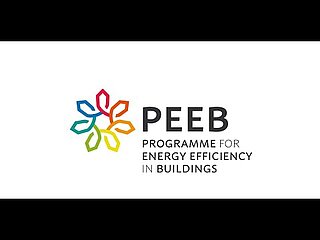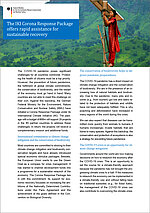Programme for energy efficiency in buildings (PEEB)
The IEA estimates that the number of buildings worldwide will double by 2050. Buildings already account for around 30 percent of global final energy consumption; however, despite existing sources of financing, investors lack the necessary knowledge and the political framework conditions for climate-friendly construction. The PEEB is a demand-driven and needs-oriented consulting institution that combines the financial and technical knowledge of the German and French project partners. The programme supports the further development of energy efficiency policies in the building sector and the development of incentive systems to mobilise private investment. Specific projects are developed until they are ready for financing and participating stakeholders receive further training for their tasks during the various stages of the development process. The results are prepared and introduced as practical examples into the GABC and other networks. The project is part of the IKI Corona Response Package.
- Countries
- Mexico, Morocco, Senegal, Tunisia, Viet Nam
- IKI funding
- 10,919,196.53 €
- Duration
- 10/2017 till 12/2025
- Status
- open
- Implementing organisation
- Deutsche Gesellschaft für Internationale Zusammenarbeit (GIZ) GmbH
- Political Partner
-
- Ministry for Environment and Sustainable Development (MEDD) - Senegal
- Ministry of Environment and Natural Resources (SEMARNAT) - Mexico
- Ministry of National Territory Planning, Urban Planning, Housing and City Policy – Morocco
- Ministry of Natural Resources and Environment (MoNRE) - Viet Nam
- National Agency for Energy Management (ANME) - Tunisia
- Implementing Partner
-
- ADEME - Agence de la transition écologique - France
- AFD - Agence Française de Développement
State of implementation/results
- Mobilisation of financing and green recovery:
- PEEB has developed a financing pipeline of EUR 1.9 billion for large-scale energy-efficient building projects through the development bank AFD. Implementation of these projects has begun. (www.peeb.build/…)
- PEEB supports partner countries in improving their energy efficiency policies, climate targets and investment conditions for buildings to ensure that such projects are replicated.
- The PEEB approach combines project financing with improvements in the legal and technical framework.
- Example: In Tunisia, the financing of 2 energy-efficient hospitals (total investment volume of up to € 158 million, calculated CO2 savings 6892 t/a) is accompanied by an improvement of standards and training measures. As a result, the 10 additional hospitals can also be built to a higher energy efficiency standard. (www.peeb.build/…)
- Internationally, PEEB works closely with GlobalABC, UNFCCC, NDC Partnership and other actors for climate action in the building sector.
- PEEB has also strengthened cooperation with the private sector, including the establishment of National Alliances for Buildings and Construction in Morocco, Mexico and Tunisia, which has enhanced projects by private developers.
- Training on financing and implementing energy efficient buildings has reached more than 650 professionals from the public and private sectors, including banks, to date.
- Publications on key topics of the building transformation, such as the integration of the building sector into the Nationally Determined Contributions (NDCs), building materials/embodied carbon, funding programmes and non-monetary incentives, green buildings, buildings, guidance on energy-efficient building design.
- Advising the Ministry of Housing and the state housing company Al Omrane on the preparation of a national green housing programme and supporting the private sector and the Moroccan Buildings Alliance in the implementation of sustainable buildings.
- Through advice from PEEB, energy efficiency requirements were included in the hotel construction standard and the construction of two energy-efficient hotels of a national hotel chain was included.
- PEEB advised the Ministry of Environment on a roadmap to develop energy efficiency regulations for the construction sector and supported the implementation of a regional energy efficiency guideline. (www.peeb.build/…)
- Through trainings by PEEB, the construction departments of the ministries are equipped for energy efficient projects financed by loans from AFD and others.
- Through AFD, PEEB is financing the construction or rehabilitation of two hospitals (€ 158 million). In order to scale up hospital projects in the health sector (www.peeb.build/…), PEEB supported the national energy agency ANME in the development of a guide for energy-efficient hospitals and in training. (www.peeb.build/…)
- Further development of the national IT tool (CLIP II) for calculating compliance with the Building Energy Performance Directive and the development of Energy Performance Certificates.
- PEEB supported the Ministry of Construction in developing an NDC roadmap for the building sector. This enabled the Ministry of Construction to submit a project application for a housing NAMA (EUR 17.3 million) to the NAMA Facility.
Latest Update:
04/2024
Further links
Project relations
Legend:
The link has been copied to the clipboard






![[Translate to English:]](/legacy/_processed_/5/5/csm_Indien_EE_Solar_Frau_bfcf99c425.jpg)
